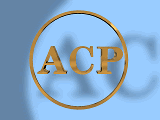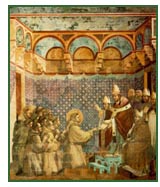American Catholic Press
16565 S. State Street, South Holland, Illinois 60473
|
||||||||||||||||||||
|
|
||||||||||||||||||||
|
||||||||||||||||||||
by Father John Dreese The Church has three sacraments of initiation, baptism, confirmation, and Eucharist. It is presumed in the Church’s ritual, in its catechism, and in its Code of Canon Law that the three sacraments will be received in that order. The Code of Canon Law tells us that the sacrament of confirmation is to be conferred on the faithful at about the age of discretion, that is, 7-8 years old. In putting confirmation at that age, the Code reflects accurately most of the history of the Church during which confirmation preceded First Communion.
Since most Catholic adults received confirmation after their First Communion
they presume that order to be normal. They find it hard to understand that the
order of the two sacraments for them was backwards.
It is a fact that confirmation in the early centuries of the Church was understood There has been some confusion in recent church history about the origins and meaning of confirmation. Some recall the theology that taught this sacrament makes us �strong Christians and soldiers of Jesus Christ.� These people think that this theology was revealed by Jesus and is unchangeably true. They remember the bishop giving children a slight slap on the cheek to remind them that they must be ready to suffer for Christ and the faith. In the new Rite of Confirmation, however, the slap is gone. In the catechesis of the Church, �strong Christians and soldiers of Jesus Christ� has disappeared. confirmation never did make young, innocent, and immature Catholics into warriors for Christ. In the United States, because of differing practices in various dioceses and different emphases on the meaning of confirmation by various groups, the bishops received from Rome permission to administer confirmation to the faithful any time between the ages of 7 and 18. This permission was good for five years, from May 1994 to July 1999. Because the bishops could not agree on a particular age, they asked Rome to allow a wide divergence of practice,, There are now various arguments being made to defend the specific practice dear to a particular diocese or to a particular lobby in the Church (e.g. youth ministers; high school teachers). Since 1990 the bishop of Columbus has allowed our parish to combine confirmation and First Communion for second graders. In these seven years our bishop has had a chance to compare this practice with other parishes of the diocese which administer confirmation in junior high school. After a recent celebration of the combined sacraments here, he remarked to me that many of the parents seemed deeply moved and close to tears. He found them to be more intensely moved by the liturgy than parents were at other confirmations celebrated separately. To explain the difference, consider the following facts. With second graders, no parent-child hassle about whether the
child is to be confirmed exists. Firm believers in Jesus, the sacraments
and the Church, the children want to be confirmed and their parents
are happy to help them. Junior high school students have entered
into adolescence with its normal rebellion against older authorities.
In that state, questioning the faith is a common characteristic.
Asking these students, at this time in their lives, to make a commitment
to a faith with which they are struggling is unnatural at best
and cruel at worst. Confirmation/First Communion in the second
grade is a family feast. Often four generations of family are present,
all joyful and happily celebrating. Parents, alienated from each
other, come together for this celebration. Their children and families
experience, if only for a day, what all believe in their hearts
marriage and family should be like, ideally. In our parish, parents instruct
their children for confirmation/First Communion. They have, therefore, not only
a sense of accomplishment when their child receives these sacraments, but they
also learn what initiation into the church means. They have taught it to their
children; and, as all know, the best way to learn is to teach. When the bishop, the chief priest of the local Church, presides at a child’s confirmation/First Communion, the experience powerfully teaches second graders. The renewal of baptismal promises, the anointing with chrism after baptism, the invoking of the Spirit, and finally the sharing in the one bread and one cup of the Lord tell the child you have now become a full- fledged member of the Body of Christ. Parents and sponsors watch and listen. As they participate in the completion of initiation of their children into the Church, the Body of Christ, they learn that the Eucharist is the high point of the life of the Church. That Body of Christ, into which they were incorporated by the sacraments of initiation, is most fully realized when they personally participate in the Eucharist.
Many say children are too young to be confirmed in second grade.
Clearly, however, if infants can be baptized—and in the
Eastern Church confirmed and eucharistized—then
they are not too young for confirmation. Even the new Catechism (1308)
reminds us chronological age or maturity are not required for confirmation.
|
||||||||||||||||||||

 as
the completion of baptism. This anointing after Baptism was the last step before
the catechumen went into the Eucharistic assembly and received Holy Communion
for the first time. Such was, and is, the normative pattern for these sacraments
of initiation, as we see clearly in the Easter Vigil reception of adult converts.
Once a person has received their First Communion, they are a fully initiated
member of the Church, as much a Catholic as the Pope. There is no second degree
membership in the Church. To receive confirmation after having received one�s
First Communion is like a bride getting an engagement ring on her fifth wedding
anniversary. It may be nice, but it makes no sense!
as
the completion of baptism. This anointing after Baptism was the last step before
the catechumen went into the Eucharistic assembly and received Holy Communion
for the first time. Such was, and is, the normative pattern for these sacraments
of initiation, as we see clearly in the Easter Vigil reception of adult converts.
Once a person has received their First Communion, they are a fully initiated
member of the Church, as much a Catholic as the Pope. There is no second degree
membership in the Church. To receive confirmation after having received one�s
First Communion is like a bride getting an engagement ring on her fifth wedding
anniversary. It may be nice, but it makes no sense!